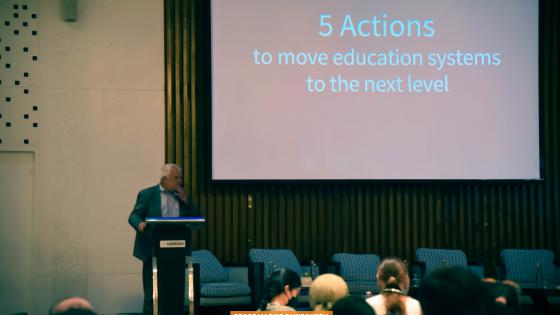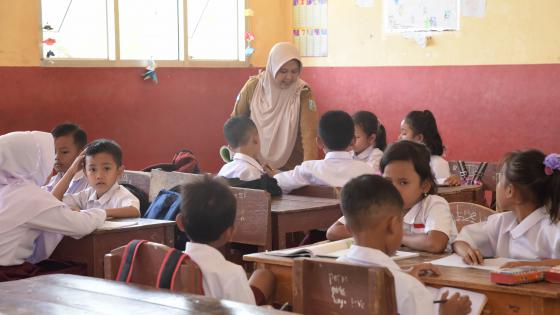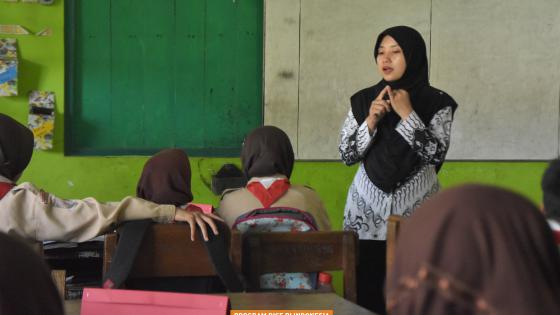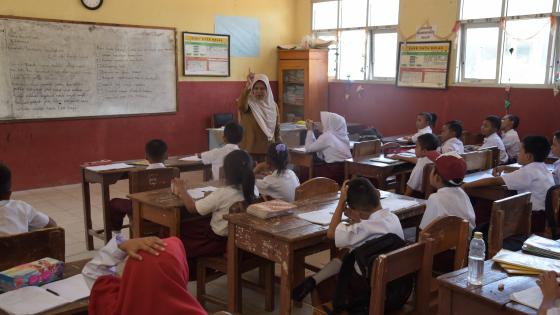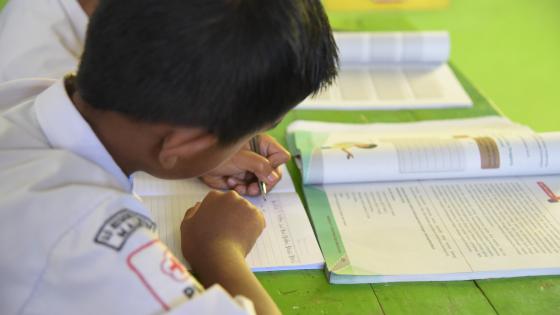Photo illustration: Novita Eka Syaputri
The latest research by RISE Programme in Indonesia (RISE) on teacher recruitment policies and practices further emphasise the muddle in teacher governance policies. The next question is, is it true that the main problem for our teachers rests in the poor selection process for prospective teachers, which results in a less quality learning process? It might be better to put the issue of teacher governance in a broader perspective, such as the vision and the calling as a teacher.
The RISE research found that the poor recruitment process by regional governments was due to their limited role in the planning and implementation of teacher selection. Regional governments are unable to determine quotas for teacher formation as needed. Meanwhile, it is not easy for the central government to determine the quota according to regional needs due to budget constraints. Moreover, the regional autonomy and the low capacity of regional governments also hinder learning quality improvement. The teacher selection policy, in the end, only produces low-performing civil servant teachers.
In the midst of the muddle of teacher recruitment policies, some opportuniststake advantage of teachers’ confusion for personal and group gains. The phenomenon of the politicisation of teachers in the recruitment process through the motivation of political economy interests of local officials also encourages the emergence of demands from honorary teachers triggered by political promises to have them appointed as civil servants. If necessary, without even taking the test! As a result, the honorary teachers easily become a source of power that can be manipulated by certain interests, such as teacher organisations that use the existence of honorary teachers as bargaining power for hidden political interests.
Education policies to solve teacher problems are often not based on a complete and comprehensive paradigm but rather partial, sectoral, and reactive one. This is reflected in various programmes to fill teacher formation in the outermost, frontier, and underdeveloped regions (3T), such as the Frontline Teacher (Guru Garis Depan) and Undergraduates Educating in the Outermost, Frontier, and Underdeveloped Regions (Sarjana Mendidik di Daerah Terluar, Terdepan, dan Tertinggal) programmes. These programmes caused many problems on the ground and even provoked envy amongst teachers who had long served in the 3T regions. Duplicating the concept of the Indonesia Teaches (Indonesia Mengajar) movement to meet the needs of teachers in the regions is clearly a fatal mistake in observing education issues that require careful planning, long-term vision for the future, and continuous sustainability.
Three Main Issues of Teacher Quality
Is it true that our teacher quality problem is just a governance issue? There are at least three issues that we need to observe.
First is the assumption that RISE's research on teacher issues is a governance issue. Poor teacher governance produces less qualified teachers. The absence of qualified teachers results in the low quality of children's learning. Indeed, from this perspective, RISE's research results are affirmed and confirmed. However, it seems that something is still lacking if we look at the low quality of learning just by assuming that the main issue lies in the governance. The end result of a learning process in education does not always have to begin with a good recruitment process. The recruitment of good teachers without the ability to build a morally friendly educational ecosystem will demoralise teachers and even distance them from professional performance and demands.
Second, the governance paradigm is actually heavy on the administrative and regulatory aspects, yet it does not touch the essence of teacher training that makes individual teachers a teacher. Poor teacher governance stems from the failure of the system to select teachers who have the motivation and the calling as teachers. When teachers' position is only seen as a political and economic issue, both by regional government officials, teachers, and teacher professional organisations, that is when our education will always face a bleak period.
What makes a teacher so that regardless of their conditions, they would have some sort of metacognitive ability and motivation to continuously improve their quality without the need for control from agencies outside themselves?
Teachers should be recognised as independent individuals who can take responsibility for their choices or callings as teachers. The essence of the teaching profession is actually in their personal commitment, vision, and mission that shape their calling as a teacher. No matter how good teacher governance is, if the selection process fails to capture the most fundamental point in the teaching profession, producing individual teachers who are able to motivate students to become independent learners will remain challenging.
The third problem with teachers is not only the selection process, but also teachers who are already in the teaching stream, who are currently filling the classrooms; about three million of them. Therefore, yes, the selection needs to be updated, but in terms of continuous professional development, it is necessary to think about how to find effective and systematic ways to improve the quality of teachers.
Trusting Teachers
To produce teachers who are dedicated, committed, have a noble personal vision, and live up to their duties and work of teachers as part of their calling to perfect themselves and make a better society, would require teachers who have a transformative vision. Moreover, the teacher with transformative vision must also believe that this is the vision to change themselves and their environment. An educational ecosystem that is morally friendly becomes a sine qua non condition for the growth of teacher spirituality. By having a high commitment to values and moralsthe teacher will find and walk through the path of self-development, without having to be told.
Trusting teachers, thereby recognises them as human beings who continue to grow and transform themselves. This journey is not linear; there will be surprises. Teacher selection might be poor, but if the educational ecosystem can support the growth of motivation, mission, and commitment of teachers to their callings, I am certain that such teachers will become a burning fuse that will improve the quality of learning in the classrooms.
Alternatives for improving the quality of teachers may not only exist in a linear managerial governance process but also through a process of giving trust and developing a morally friendly educational ecosystem, where individuals can grow and transform themselves in a continuous learning process.
This article was written by Doni Koesoema A. (a member of the Board of National Education Standards and a member of the Advisory Board of RISE Programme in Indonesia).

